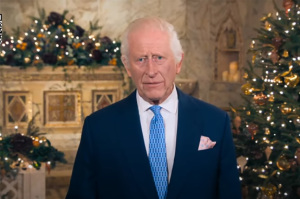Joel Osteen: Preach God's Truth; Don't Avoid Sin, Repentance

I thank God for the wonderful work that many large ministries have done over the years, but there is a very troubling trend in the evangelical church as a whole. And I believe that the pulpit is partly to blame.
Pastor Joel Osteen has been very clear many times that he doesn't talk about hell, sin, or damnation, or anything that is hard to hear.
He recently said this in a special Easter edition of CBS Sunday Morning, "... most people are beaten down enough by life. They already feel guilty enough. They're not doing what they should, raising their kids — we can all find reasons. So I want them to come to Lakewood or our meetings and be lifted up, to say, 'You know what? I may not be perfect, but I'm moving forward. I'm doing better.' And I think that motivates you to do better."
I agree that we all need encouragement, that's a given, but, in my opinion, most people feel beaten down because they're not looking to the totality of God's truth but only certain portions. The truth is often watered-down in the hope of not offending members and building a large audience. Judgment is never mentioned and repentance is rarely sought. We want to build a church rather than break a heart; be politically correct rather than biblically correct; coddle and comfort rather than stir and convict.
This is not a letter of rebuke (I'm in no position to do that) — it's a tear stained plea that we return fully to God's truth ... that's the encouragement. You cannot teach on being a better parent without teaching repentance. You can't teach on having a strong marriage without dying to self.
Pastor Joel, I don't know much about your ministry, but it appears that your gift is motivation — please use it to motivate people to turn from sin. We don't beat people up with the truth, but we do lovingly point them to it.
The pulpit regulates the spiritual condition of God's people which affects the nation. A lukewarm, sex-saturated culture (and church) simply reflects the lack of conviction in the pulpit as well as the pew. Most pastors, including myself, struggle with speaking about controversial issues, but it must be done. A motivational speaker might be able to avoid the difficult truths of the Bible, but a pastor cannot.
We must preach the difficult truths as well as the joyful ones; preach the cross and the new life; preach hell and preach heaven; preach damnation and preach salvation; preach sin and preach grace; preach wrath and preach love; preach judgment and preach mercy; preach obedience and preach forgiveness; preach that God "is love," but don't forget that God is just. It is the love of God that compels us to share all of His truth.
Paul said to Timothy, "For the time will come when they will not endure sound doctrine; but wanting to have their ears tickled, they will accumulate for themselves teachers in accordance to their own desires, and will turn away their ears from the truth and will turn aside to myths" (2 Tim. 4:3-4).
This should sound an alarm in the the heart of every preacher, pastor, and teacher to seriously reevaluate their ministry — are we encouraging sin by not warning? If so, we're heading down a dangerous path.
I believe that we can be both loving and truthful. How can we warn if we won't confront? How can we correct if we won't challenge? How can we contend for the faith if we won't question lifestyles that oppose it?
"The church must be reminded that it is not the master or the servant of the state, but rather the conscience of the state" (Martin Luther King, Jr.).
Not everyone is an A.W. Tozer, Leonard Ravenhill, or a John the Baptist, but all pastors have a biblical mandate to preach the truth.
"Christ Jesus came into the world to save sinners" (I Timothy 1:15), yet, many avoid words such as sin and repentance. The good news about Christ can only be appreciated with the bad news as the backdrop. When we fail to proclaim God's Word faithfully, we run the risk of "encouraging sin" and "perverting the words of the living God" (cf. Jeremiah 23).
All of us must return to the prayer closet where brokenness, humility, and full surrender take place. Without prayer, "the church becomes a graveyard, not an embattled army. Praise and prayer are stifled; worship is dead. The preacher and the preaching encourage sin, not holiness … preaching which kills is prayerless preaching. Without prayer, the preacher creates death, and not life" (E.M. Bounds).
"Without the heartbeat of prayer, the body of Christ will resemble a corpse. The church is dying on her feet because she is not living on her knees" (Al Whittinghill).
Where are the Tyndales and Huss' who were burned at the stake for simply declaring the truth? Where are the Luthers who, when asked to recant or face possible execution, said, "Here I stand; I can do no other"? Where are the John Calvins who shape the religious thoughts of our Western culture? Where are the John Knoxs who cried, "Give me Scotland [for the cause of Christ] or I die"? Where are the Whitefields who shook continents?
Where are the Spurgeons who spoke with such authority that his sermons are read more today than ever before? Where are the D.L. Moodys who brought America to her knees? Where are the Evan Roberts who, during the Welsh Revivals of 1904-5, preached so powerfully against sin that people cried out to truly know God? Where are the Puritans like Richard Baxter, who said with such humility, "I speak as a dying man to dying men"?
As the church falls deeper into self-reliance and further from reliance on God, our need for bold leadership has never been greater. Change in our nation will only occur when there is a strong conviction of sin, genuine faith, humility, and sincere repentance, beginning in the pulpits. May God grant us the wisdom and strength to proclaim these truths.
We must stop confusing God's patience with His approval and preach with conviction from the pulpits again — as dying men to dying men.
For a two-minute sermon on passionate prayer; click here.





























